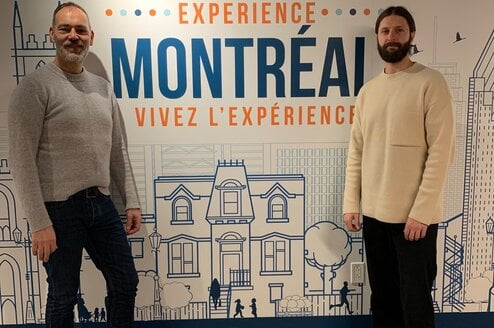Teach English in Montreal, Canada
Teaching Programs in Montreal
About
The second largest city in Canada after Toronto and the largest city in the Quebec province, Montreal has been hailed as “Canada’s Cultural Capital.” Anyone visiting Montreal will quickly notice the city’s French influence, aesthetic architecture, and European charm.
French is considered the city’s official language and is spoken by the majority of Montreal’s population. Montreal, home to the prestigious McGill University, also has a high concentration of post-secondary students relative to other North American cities and allows teachers to teach English or French in a distinct cultural center. Teachers in Montreal will quickly realize that there’s a lot they can do outside of work as the city offers numerous options in the forms of high quality dining and entertainment.
Job Types
Prospective teachers should keep in mind that the education system of Quebec is different from most other systems in that there is a supplementary college level called CEGEP after high school that precedes university. The majority of these CEGEPs offer courses in French, but teachers will also find CEGEPs that teach courses in English. Montreal also has a large immigrant population who take English classes upon arrival in Canada, allowing teachers the opportunity to teach basic English as a Second Language (ESL) classes.
International and Private Language Schools:
For those less familiar with French, international schools may be a more appropriate place to teach. There are international schools, such as the Children’s World Academy, that blend both French and English course offerings to offer students a comprehensive learning experience and English private schools like College Prep International, which offers instruction for primary and secondary students. In addition to these schools, Academie Linguistique Internationale (ALI), located in the center of downtown Montreal, is a private language school offering English and French as a second language courses
Public Primary and Secondary Schools:
Teachers interested in teaching younger, pre-university students can look into the English-language elementary and secondary public schools that are run by the English Montreal School Board and Lester B. Pearson School Board. Prospective teachers can visit these sites to search for public English-language elementary and high schools in the Montreal area. French-language elementary and secondary public schools, on the other hand, are run by separate organizations such as the Commission scolaire de Montreal (CSDM) and are better suited for those already skilled in French.
Colleges and Universities:
For the most part, students must attend a separate preparatory college before university admission. Public CEGEPs are state-run colleges that service this preparatory function and have little or no tuition fee. There are also private colleges that may be colloquially referred to as a CEGEP, though an official CEGEP is publicly funded. Currently there are 5 English CEGEPs and 6 English private colleges that teachers may consider teaching at. These English-language CEGEPs include Vanier College, Marianopolis College, and Dawson College. Montreal also offers teaching opportunities at universities. The primary English-language universities in Montreal are McGill University and Concordia University.
Find a Job
When and Where to Look for Jobs:
The school calendars for English-language public schools in Montreal look similar to many of the school calendars found in the United States. The English Montreal School board states the school year as running from the end of August to the end of June, so teachers may want to considered looking for jobs in the spring or beginning of summer. Teachers should first decide whether they would prefer to work in the suburbs of Montreal or closer to downtown. In order to find jobs, teachers can search within the English-language school boards, or utilize online resources that may include postings for private teaching lessons.
Qualifications:
Although it may not necessarily be required, learning French is strongly recommended for those looking to live in Montreal. Though most in the city are bilingual, teachers with previous experience in the language will feel more like a part of the community and will have an easier time communicating with students and locals.
To become certified to teach in Canada, teachers can take a TEFL certificate course in Montreal that is recognized by TESL Canada. Teachers who choose to go this route will receive job assistance and may be placed in language schools, universities, colleges, and establishments where business English training is compulsory.
Those without TEFL certification need a bachelor’s degree and teaching certificate issued by the MELS, or the Ministry of Education, Recreation and Sports, of Quebec. This will involve taking specific courses required by the Quebec province in education and Quebec law. Teachers must receive this certification regardless of grade level and whether or not they are teaching English in the English-language or French school system. Certification is also required for teaching students at a CEGEP or Continuing Education/Adult Education program.
Need to Know
Salary & Cost of Living:
The average salary for teachers in Montreal is around $4500/month, though this number will vary depending on the teacher’s experience and specific job placement. Overall, Montreal is not a cheap place to live relative to most other cities outside of North America and Europe. Montreal’s cost of living is currently 87 out of 780 international locations, with rank 1 being the most expensive, and food and clothing is likely to be on the pricier end. However, apartment rent in Montreal is generally more affordable than the housing found in some of the U.S.’s major cities. Average rent per month for a 1-bedroom apartment in the city center is $900 while Montreal's monthly rent for a similar apartment outside the center is $625. For more affordable housing teachers can look into home-stays, hostels, and shared housing.
Classroom & Work Culture:
Teachers from the United States won’t notice a huge difference in classroom cultures. Punctuality is valued, and many high schools and private schools require uniforms. Teachers may or may not have to dress more formally depending on what type of school they are placed in, and women should avoid wearing overly revealing clothing, especially for first time meetings. For the most part, Montreal citizens can speak enough English, but it’s polite to first apologize for not speaking French and then asking permission to speak in English when you’re approaching someone for the first time.












